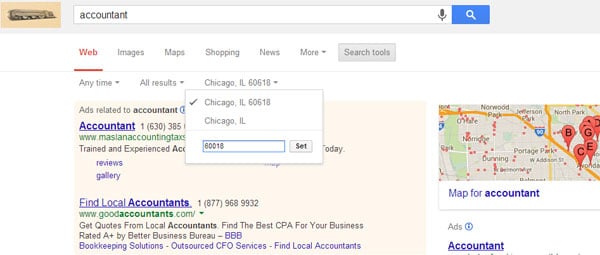What's Your GEO-Rank?

Search engines have evolved to the point where Internet professionals must understand where their website is actually ranking when users search for them (and their content or services) from different locations. Doing so can help today's enterprises discover some never-before-seen competitors, perhaps even identify new link partners, and overall, be better able to position their digital brands for big things on a local and global level simultaneously. So how do you find out where exactly you rank in specific geographic locations?
Most brands are simply not going to be concerned with where they rank in different locales, but perhaps they should be. There always seem to be instances when undertaking a link building initiative yields opportunities that are far more accessible when SEOs think on a more local, a more granular level. For example, say you're responsible for the SEO of a restaurant franchise, a church/non-profit organization or perhaps a small local service business (e.g. accountant, plumber, lawyer) which serves only a few neighborhoods or zip/postal codes.
In large metropolitan areas (like Chicago) where the competition is high for almost everything and suburban enterprises struggle to earn placements with their often more well-funded urban counterparts, focusing SEO (and ultimately link building) efforts on more geographically centered optimization will likely, in almost every case actually, yield far better results than any non-geo effort ever could. Why? Scale - it's easier to identify problems and opportunities and cross them off your virtual to-do list when the pool of results is smaller. At least it feels that way.
While a handful of the leading SEO software solutions will provide details on specific rankings for a user's pre-defined geographic regions, experienced search engine optimization professionals will know that Google actually already does a rather exceptional job of providing this information. It's not a perfect process or system of course as you need to know where to look and it will have to be done manually, but it will most certainly do in a pinch, particularly in scenarios where a few shrewd moves will make a big difference. Let's look at a particular example.
It's probably best to log out of your Google account for this little experiment first. Once you've done that, pick a geographic area (probably best to know the zip code, although it's not mandatory). Say for example that we're a suburban-based Chicago accountant and we want to know who in our immediate vicinity we're currently competing with (we also want to know where we rank). On each Google search results page, the "Search Tools" item will appear. Upon "mouse over" of that option, searchers will be able to filter based on time, the type of results, as well as the location - which is what we're interested in.
First, enter your own town or enter a specific zip code. You'll see one set of results that should serve as your baseline (if you're logged in to a Google account it will actually auto-detect your location - so, again, make sure you're logged out). Conduct at least five different queries (actually try the same query, but with different locations set) and do your best to notice patterns; shifts on the search results themselves, as well as new or removed listings when the filter changes. Over time, you'll build out a list of sites that are ranking right alongside yours, and be able to identify who's besting you, and what sites are outperforming your own. Keep track over time of the filters and search terms you use and you'll be better off when you need to report SEO performance. That's only half the battle though - you still need to take steps to earn links.

We won't go into detail about all the different ways you can build links on a local level but let's return to our example of a suburban Chicago accountant which can serve as a good guide. Let's say that the accountant's website is ranking competitively for some modestly high traffic, but longer tail search terms. It's always possible to rank higher (unless of course you're already in the first position) and we know that fast track to being above the fold is to increase the number of inbound links - so from whom should we try and acquire links from?
In the case of our Chicago accountant, they might want to do some outreach with some non-competing businesses. For example, accounting services are useful to a broad number of other businesses and enterprises - from chambers of commerce, their own clients, even businesses that offer complementary services (in our case that might be Web hosting services, advertising agencies, etc.).The beauty is that we can use the exact same search process to identify potential link partners - enter a search term, filter by location, etc. Who wouldn't be more likely to link to a website that was down the street instead of one that was half-way across the world?
Those responsible for International SEO have even more challenges - at least from the perspective of additional work to complete, relationships to build, custom content to develop, etc. A majority of work put in by search engine optimization professionals is creating content, and the rest is raising awareness for that content (which more often than not, means building quality citations for that content). Understanding where a website and its page rank in different international locations can help focus your attention on where your time and talents can best be spent.
One recent site that has made the rounds recently has been that of HowsThisLookin.com, a tool provided by Trusted Proxies. The Web-based solution enables SEOs to perform queries on different Google TLDs - for example, search for google.ca from Canada, the UK, the US, etc. The tool reveals how the search results appear in these locations, and an astute eye will be able to identify the differences in the rankings by country.









